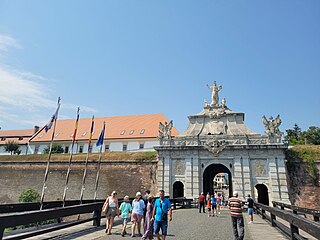Gottschalk or Godescalc (Old High German) is a male German name that can be translated literally as "servant of God". Latin forms include Godeschalcus and Godescalcus.

Edward is an English male name. It is derived from the Anglo-Saxon name Ēadweard, composed of the elements ēad "wealth, fortunate; prosperous" and weard "guardian, protector”.

Alba Iulia is a city that serves as the seat of Alba County in the west-central part of Romania. Located on the river Mureș in the historical region of Transylvania, it has a population of 63,536.
Gottschalk, sometimes rendered as Godescalc, was a prince of the Obotrite confederacy from 1043 to 1066. He established a Polabian Slavic kingdom on the Elbe in the mid-11th century. His object in life seems to have been to collect the scattered tribes of the Slavs into one kingdom, and to make that kingdom Christian.

Adolf is a given name with German origins.
Gottschalk of Orbais was a Saxon theologian, monk and poet. Gottschalk was an early advocate for the doctrine of double predestination, an issue that ripped through both Italy and Francia from 848 into the 850s and 860s. Led by his own interpretation of Augustine's teachings on the matter, he claimed the sinfulness of human nature and the need to turn to God with a humility for salvation. He saw himself as a divine vessel calling all of Christianity to repent for decades of Civil War. His attempts of this new Christianisation of Francia ultimately failed, his doctrine was condemned as heresy at the 848 council of Mainz and 849 council of Quierzy. Following his conviction as a heretic Gottschalk remained stubborn to his ideology disobeying the ecclesiastical hierarchy, making him an "actual heretic in the flesh", for this disobedience Gottschalk was placed in monastic confinement; however the shockwaves his ideology sent around Western Christendom refused to stop reverberating, Gottschalk managed to win over more followers and the threat remained up until his death in 868.
Adler is a surname of German origin meaning eagle. and has a frequency in the United Kingdom of less than 0.004%, and of 0.008% in the United States. In Christian iconography, the eagle is the symbol of John the Evangelist, and as such a stylized eagle was commonly used as a house sign/totem in German speaking areas. From the tenement the term easily moved to its inhabitants, particularly to those having only one name. This phenomenon can be easily seen in German and Austrian censuses from the 16th and 17th centuries.
Einhorn is German for unicorn. It is also used as a surname. Notable people with the surname include:
Rabinovich or Rabinovitch, is a Russian Ashkenazi Jewish surname, Slavic for "son of the rabbi". The Polish/Lithuanian equivalents are Rabinowitz or Rabinowicz.
Rappaport is an Ashkenazi surname, with the individuals bearing it being descendants of the Rabbinic Kohenic Rappaport family. Variants of the name include Rapaport, Rapa Porto, Rappeport, Rappoport and Rapoport.
Clemens is a Late Latin, German, and Dutch masculine given name and a surname, meaning "merciful".
Alfred Gottschalk may refer to:

Alfred is a masculine given name of English origin, a modern descendant of the Anglo-Saxon name Ælfræd, formed from the Germanic words ælf, meaning "elf", and ræd, meaning "counsel". Its feminine form originating from Romance languages is Alfreda, and diminutives of Alfred include Al, Alf, Alfy, Alfie, Fred, and Freddy. After the 11th-century Norman Conquest, many variants of the name emerged, most of which were not carried to the modern day. Today, Alfred is still in regular usage in a number of different regions, especially Great Britain, Africa, Scandinavia, and North America. It is one of the few Old English names that came into common use in Europe. Its name day is the 3rd of January both in Norway and Sweden.
Milo is a masculine given name and a surname. The name Milo is derived from multiple sources. In the Slavic languages, the root mil- means "dear" or "beloved," and the name may have come from a Latinized form of this root. However, it is also believed that the name may derive from the Latin word "miles," meaning "soldier". It is also believed that the word comes from the ancient Greek "milos," which means "of the yew-flower". The name also bears Germanic and Gothic origins, with the word "milo," meaning "the great merciful".
Felix is a masculine given name that originates from the Latin word felix, meaning "happy" or "lucky". The feminine forms are Felicia or Felicity. The name was popularized by early Christian saints and Roman emperors.

Louis Reichenthal Gottschalk was an American historian, an expert on the Marquis de Lafayette and the French Revolution. He taught at the University of Chicago, where he was the Gustavus F. and Ann M. Swift Distinguished Service Professor of History.
Ivo is a masculine given name, in use in various European languages. The name used in western European languages originates as a Normannic name recorded since the High Middle Ages, and the French name Yves is a variant of it. The unrelated South Slavic name is a variant of the name Ivan (John).
Samson can be either a masculine given name or a surname. It may refer to: